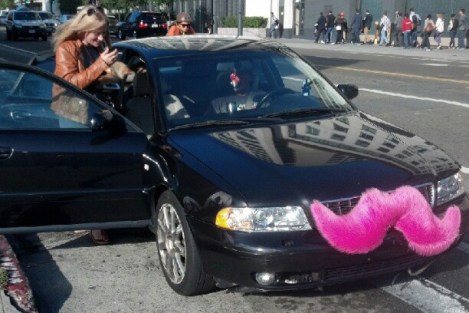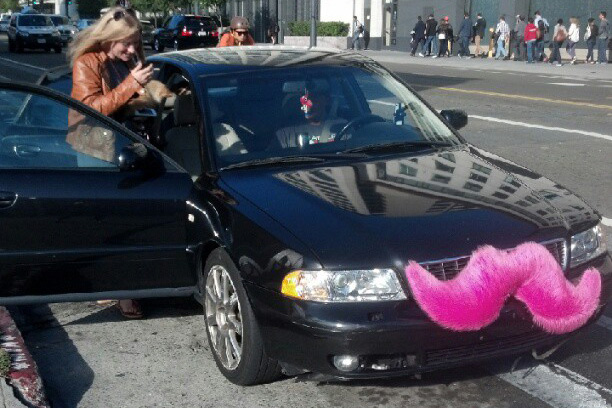It’s a good news day for peer-to-peer car-sharing, and those hideous and somewhat disturbing furry pink mustaches I keep seeing around San Francisco.

lizasperlingThe detachable pink mustache alerts ride-seekers that this ride is a Lyft.
Today the California Public Utilities Commission said it has reached an agreement with Zimride, the parent company of fast-growing California ride-share purveyor Lyft, to suspend a cease-and-desist notice and $20,000 citation against the company. The PUC is still reviewing its regulations on car-sharing programs in the Golden State and hasn’t yet reached similar deals with Uber or Sidecar, which are technically still outlaws, though they don’t have the creepy mustaches to match.
This was good timing for Lyft, which announced this morning that it would be expanding to Los Angeles neighborhood by neighborhood in an attempt to cover all that concrete sprawl. And it’s not just Lyft that has its sights set on bigger and better car-sharing markets. From Techcrunch:
The move into L.A. marks the first expansion market for Lyft, which became available to riders in San Francisco last summer. To expand into Southern California, the company sent a team to recruit drivers and build the initial community infrastructure in the city. That means interviewing drivers, inspecting their cars, and generally attempting to instill the Lyft culture into the new market. …
Lyft isn’t the only ride-sharing service that is looking to broaden its footprint. San Francisco-based competitor SideCar recently launched its service in the Seattle area, and is looking to expand even more aggressively in the coming months.
The more car- and ride-sharing companies prosper, the more pressure they can put on regulators to let them go about their business, especially if they aren’t clearly and directly taking a bite out of established taxi cab business.
Assuming car-sharing can stay, you know, legal, there are encouraging signs that smaller, peer-to-peer companies can compete with the big boys. For all the hand-wringing car-sharers did over Avis’ purchase of Zipcar earlier this month, peer-to-peer car-share start-up Getaround has twice as many cars on the road in Portland as does Zipcar.
“Anybody who’s been sort of watching the company can see that we’ve been pretty focused on building supply,” said Steve Gutman, a spokesperson for Getaround.
When Avis bought Zipcar, it emphasized that the deal would bring more cars into its network. But with peer-to-peer sharing, supply can be ramped up all the more more easily.
Peer-to-peer sharing still has a ton of untapped potential, so long as regulators let the cars keep rolling. I’d prefer to take mine without that hideous mustache, though, thanks.


